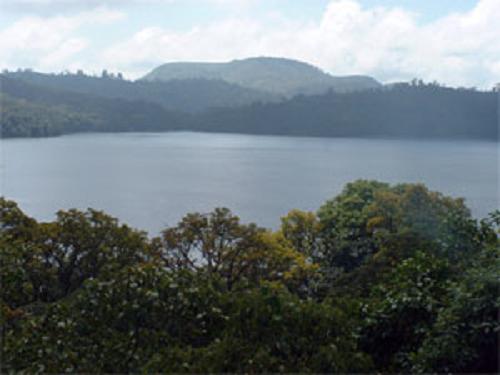Philip Forboseh
This project aims to assess the effectiveness of the community-centred system of forest management set up by the Kilum-Ijim Forest Project and make recommendations as to what interventions are needed to improve and consolidate the system.

Lake Oku in the Kilum-Ijim forest.
Kilum-Ijim communities hold cultural values with strong affinities to forest that traditionally regulated access to resources. Faced with the challenges of globalization and associated collapse of traditional social structures, respect for the forest plummeted and unregulated extraction of resources for subsistence became commonplace.
The forest is an Important Bird Area, with 15 restricted range species, including six species of Conservation Concern. Uncontrolled anthropogenic influences threaten populations of these species and other biodiversity. Between 1987 and 2003, the Kilum-Ijim Forest Project (KIFP) set-up a community-centred forest management system, including specification of conservation objectives that provide quantitative and qualitative targets by which successes or failures of the system should be measured.
Three years after project closure, there is need to evaluate the effectiveness of the system and identify actions needed to solidify conservation. This is especially relevant as the community-centred approach presupposes that local communities will ensure the regenerative capacity of valuable resources for economic development thereby promoting biodiversity conservation. There is growing recognition of the need to continually verify this fundamental assumption and in the process guide strategic and operation management. Evidently, we are unlikely to achieve the biodiversity goal with flawed underlying assumptions.
The goal of the current project is: natural forests in the Bamenda Highlands are conserved in the long-term and used sustainably by adjacent communities and the purpose is: reliable, timely and regularly available information guides strategic and operational forest management. Specifically, we plan to assess the effectiveness of the community-centred system of management set up by the KIFP, three years after the project ended, make recommendations as to what interventions are needed to improve and consolidate the system, and design a cost-effective long-term monitoring system in order to supply one of the essential elements of forest management that is now missing.
We envision an action-oriented research program that provides stakeholders timely and reliable information to guide operational and strategic decisions relevant to management of community forests at Kilum-Ijim and the wider Bamenda Highlands of north-western Cameroon.